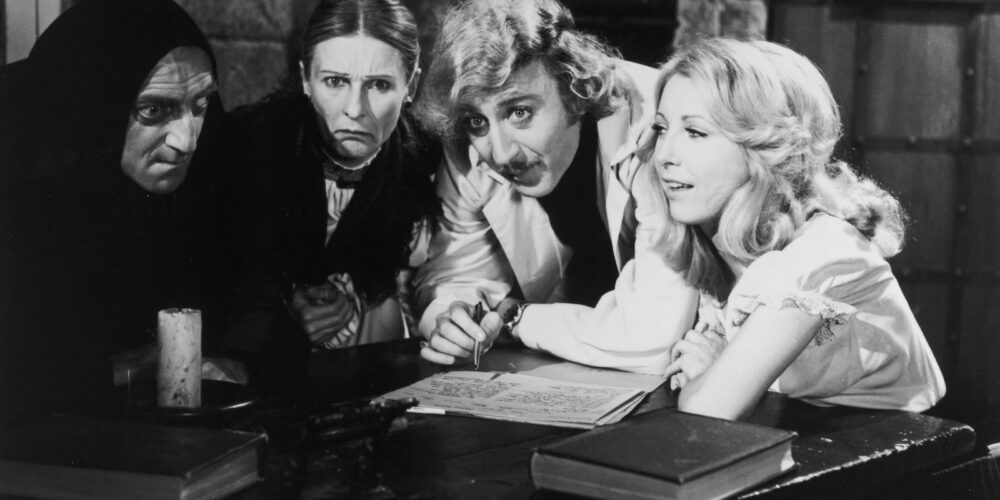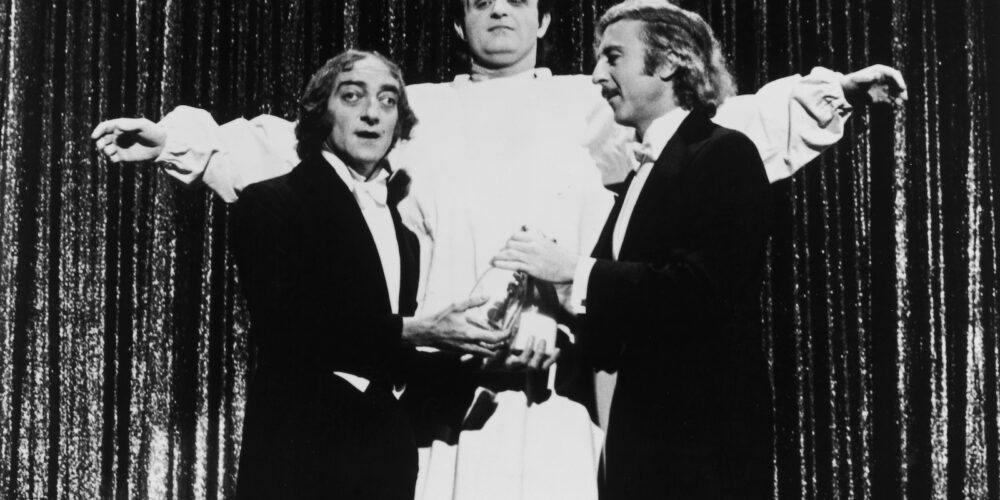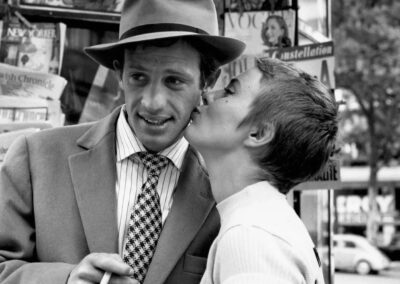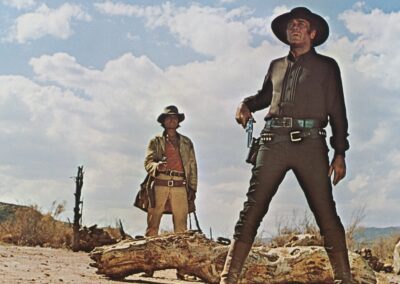I have already written elsewhere about the work of Gene Hackman, one of the finest actors to emerge from Hollywood in the late 1960s and early 70s, but, lest we forget, there was also another great Gene to be found on our screens around the same time – the hilariously manic Gene Wilder and it’s interesting to note that the two Genes even appeared together in no less than two movies. OK, a third (very great) Gene (Kelly) was still knocking them out in the 1970s but he could hardly be considered to be a star of New American cinema at that point – so we’ll move on.
Gene Wilder, who stars in and wrote Mel Brooks’ Young Frankenstein, which is being screened at the UPP over the Halloween period in a 50th anniversary print, first appeared on screen in Arthur Penn’s brutal and bloody masterpiece Bonnie and Clyde in 1967. However, prior to his Hollywood debut, he had established himself as a theatre actor of note, having studied at New York’s famous Actors Studio (just like a veritable host of other 70s stars including [deep breath] Anne Bancoft, Ellen Burstyn, Jill Clayburgh, Robert de Niro, Robert Duvall, Sally Field, Jane Fonda, Dustin Hoffman, Harvey Keitel, Jack Nicholson and Al Pacino, amongst many other notables).
His career included the several films he made with Mel Brooks – The Producers (he was nominated for an Oscar for Best Supporting Actor) in 1967 and Blazing Saddles and Young Frankenstein in 1974 but he was also memorable (nay terrifying) as Willy Wonka in Willy Wonka and the Chocolate Factory in 1971 (a role Peter Sellers apparently “begged for”); had a small cameo in Woody Allen’s Everything You Ever Wanted to Know About Sex in 1972 (as did Burt Reynolds); teamed up with firebrand actor/comedian Richard Pryor for the first time in Arthur Hiller’s 1976 “Hitchcockian” comedy thriller Silver Steak (they made four films together) alongside 70s actress par excellence Jill Clayburgh (who was nominated for Best Actress for both 1978’s An Unmarried Woman and 1979’s Starting Over, which starred Burt Reynolds and was an unlikely project for the “king of paranoia” Alan J Pakula, who had previously directed both Klute and All the President’s Men); he was in the long-forgotten neo-western The Frisco Kid in 1979 for The Dirty Dozen’s Robert Aldrich (cast alongside Harrison Ford) – and hit pay dirt (starring alongside Pryor again) with buddy prison comedy Stir Crazy 1980; which he followed with the flop Hanky Panky in 1982, which also featured his third wife, Gilda Radner, a Saturday Night Live alumni, who died of ovarian cancer, at the early age of 42.

Wilder also directed himself in a number of minor hits (The Adventures of Sherlock Holmes’ Smarter Brother in 1975 and The World’s Greatest Lover in 1977) as well as the hugely successful romantic comedy The Woman in Red in 1984.
So, what was it about Wilder that makes him so interesting, beyond a relatively successful filmography?
In the first instance, from the very first moment he appears in Bonnie and Clyde, there is something intrinsically funny about his slightly puffy face and curly hair; his awkward line delivery and the way that you know that, beneath his nervy surface, there’s something manic and possibly dangerous brewing. He’s very different to Pryor in this respect – who often plays the “doofus” in the films the two made together and who had a gift for impersonation and using his body comedically. Pryor (whose incendiary stand up routine was captured on film in 1975’s Richard Pryor Live in Concert – which is up there with Bill Hicks and Robin Williams in the pantheon of great stand-ups, in this reviewer’s opinion) was often somehow “constrained” by the films he appeared in (Paul Schrader’s brilliant 1978 directorial debut Blue Collar being a notable exception) but Wilder, who never did stand up, understood the intimacy of the camera. Whilst Pryor often hammed things up, Wilder, at his best, dials things down – knowing that every flicker of his eyes or nuanced look of panic will be captured by the camera and picked up on by the audience. Maybe there was something of the Peter Sellers in him (even though, unlike Sellers, he never allowed the characters he played to subsume him)? He was certainly the original “wild and crazy guy,” before Steve Martin arrived on the scene and stole his thunder in the 1980s – a very similar comedic presence. Like Wilder, Martin was more than capable of suggesting the rage within (just watch Planes, Trains and Automobiles, for example: a master class in repression). It’s interesting to note that both comedians also wanted to play the “straight leading man role” (Martin in 1980s Pennies from Heaven, a majorly misunderstood musical based on Dennis Potter’s critically acclaimed TV series and Wilder in Silver Streak and The Woman in Red). Pryor was never going to “carry a movie” or play the central character and, on the odd occasion when he did (The Toy, Moving and Bustin’ Loose, for example) the outcome was often a mess (although, to be fair, Pryor’s wild lifestyle and excessive drug use probably added to his inability to hold himself, let alone a movie, together: it was whilst shooting Stir Crazy that Pryor famously set himself alight whilst freebasing cocaine, with ruinous consequences on his subsequent health and career).

Secondly, Wilder rarely projected anything than his own persona – which doesn’t mean to say he couldn’t act – but rather like Woody Allen’s acting career showed, hell, if it ain’t broke, don’t fix it.
With Wilder you knew what you were going to get – and he was a good collaborator. You probably need to work well with others if you are going to be a successful director (it’s interesting that neither Robin Williams nor Steve Martin ever directed) and so the fact that Wilder often plays second fiddle to his co-stars, may also account for his genius. He might well overplay his roles on occasion (in Young Frankenstein he really lets rip – one is reminded of Sellers as Strangelove) but he doesn’t outstay his welcome, allowing other performers their time in the limelight.
It’s possibly why the relationship with Pryor worked so well; why he and Clayburgh bounce off each other beautifully in Silver Streak and why, in Young Frankenstein, you’re just as likely to remember (and laugh at) Marty Feldman, Madeline Kahn, Cloris Leachman, Peter Boyle and, yes, in case you forgot, that “other Gene” (Hackman), who cameos here, making it the second time the two had worked together (Hackman brilliantly played Clyde Barrow’s brother in Bonnie and Clyde).
Wilder effectively retired from acting on the big screen in the early 1990s, focusing on writing his memoirs and raising awareness of ovarian cancer – which had taken Radner from him at such a tragically early age. At the end of his life, he suffered from Alzheimer’s disease and in 2016 died at home, aged 83, listening to his favourite song Over the Rainbow, performed by Ella Fitzgerald.
Arguably, he was a man out of time – comedy dates pretty quickly and trends come and go; audiences can be fickle; performers (especially comics) can “burn themselves out” (that was certainly the case with Robin Williams) and there might well be a case of Wilder wanting to grow old – away from the demands of the public, the studios, the marketing teams and the “pressure.”
His was a life well lived; he made us laugh loud and long; he gave several outstanding performances in his lifetime and his genius lives long after his death. The “other” Gene was one of the funniest men on screen for well over a decade. For that, Gene, we salute you.
Young Frankenstein is showing on Sunday 20th and Thursday 24th October. Click here to book tickets.
Dr Andrew C Webber is a Film teacher and examiner with over 38 years’ experience. He currently contributes to both the Cinema of the 70s and 80s magazines (available on Amazon); cassette gazette fanzine (available from cassette pirate on e-bay) and the Low Noise music podcast available on Spotify and Apple podcasts.


